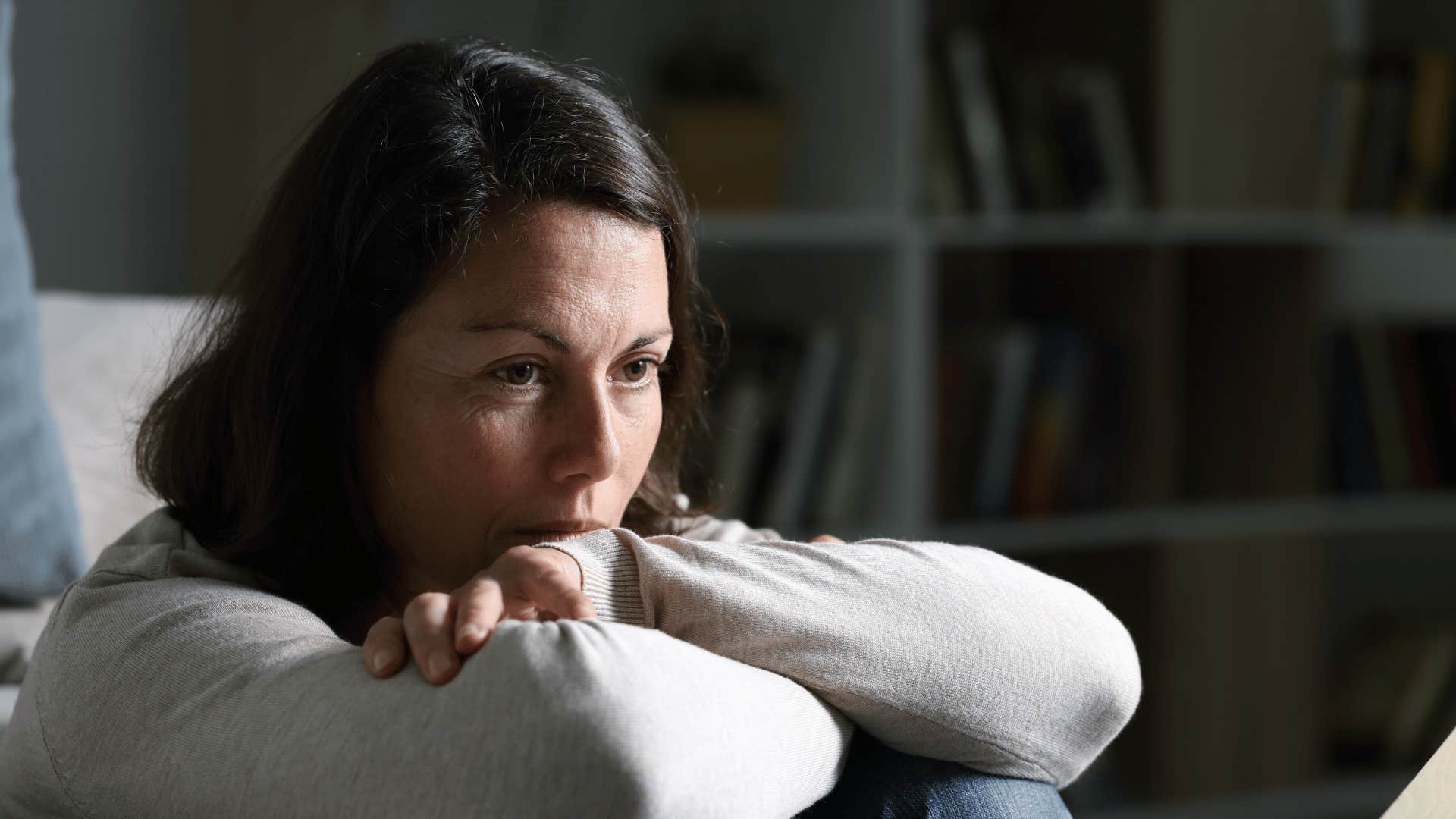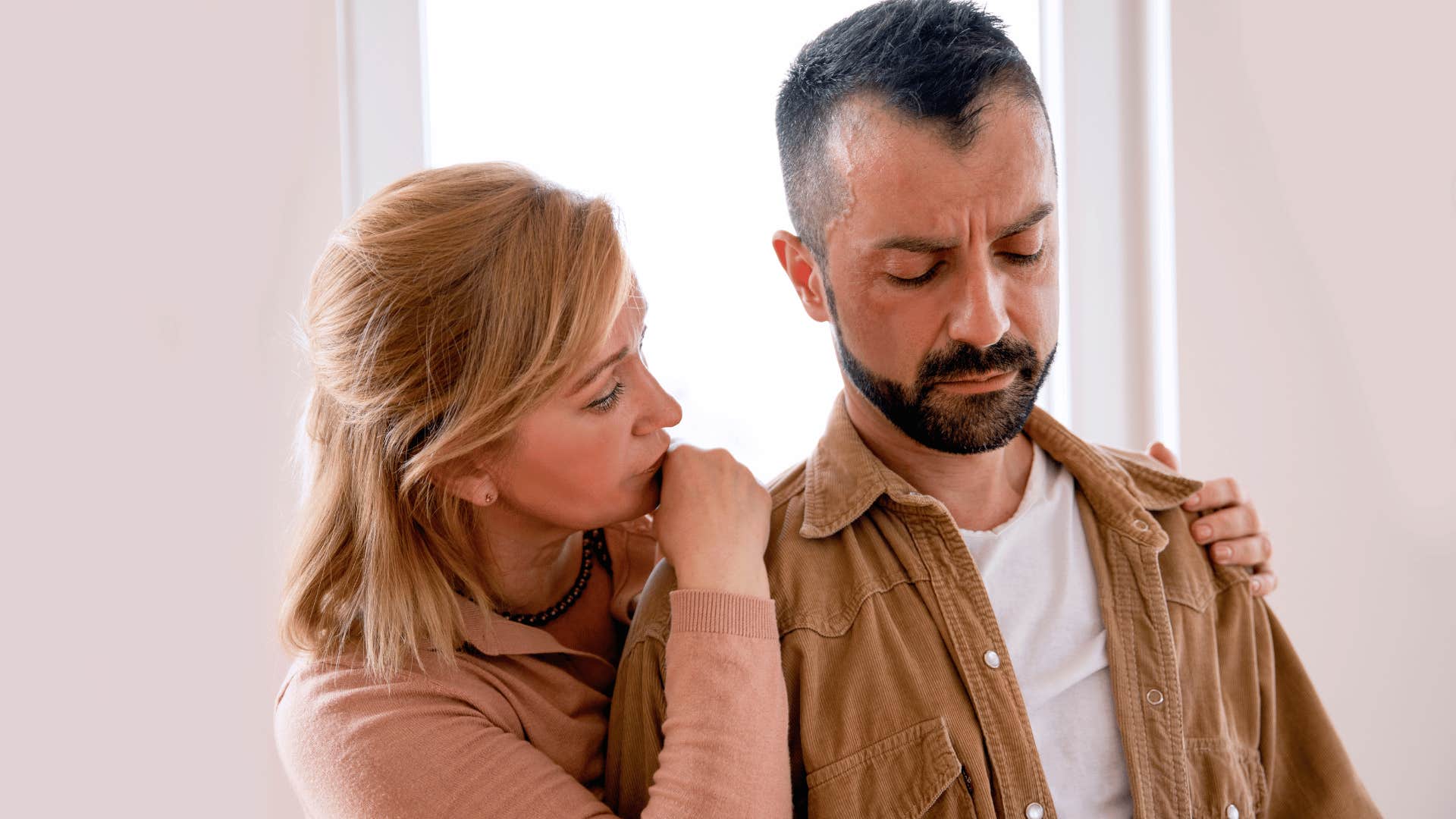9 Signs You Were Often Singled Out As A Child And It's Affecting You Now
A childhood like this can have detrimental effects.
 MAYA LAB | Shutterstock
MAYA LAB | Shutterstock People develop their self-worth based on the messages they received in their formative years.
If you were treated with kindness and acceptance, you probably learned to value yourself and believe in your abilities. But if you were treated unfairly or often singled out as a child, it probably affects you now.
Our emotional well-being is impacted by our sense of belonging. If we feel connected to other people, we see ourselves as being deserving of love and care. If we were excluded or made to feel inferior at a young age, it's more likely that we'll feel isolated and unsure of ourselves as adults.
Here are 9 signs you were often singled out as a child and it's affecting you now
1. You're scared of rejection
 Pheelings media | Shutterstock
Pheelings media | Shutterstock
As human beings, we're inherently social creatures, which means we need connection with other people to survive and thrive. If you were excluded as by other kids in school, it likely lowered your self-esteem and affected the way you form attachments in adulthood.
A 2017 study titled "Causes and Consequences of Social Exclusion and Peer Rejection Among Children and Adolescents" noted that exclusion isn't always intended to cause harm, yet the psychological effects of being excluded tend to have "detrimental outcomes in terms of emotional and behavioral health."
The study explained that being excluded at a young age can shape the way people socialize in the future. Being ostracized leads to a decrease in prosocial behavior, which means that kids who are singled out tend to withdraw from further social interaction. This withdrawal is often a self-protective measure.
Being left out by your peers can make you feel unwanted and unlikeable. Seeing yourself in such a negative light reinforces the idea that no one wants to be around you. This self-destructive feedback loop can make it hard to let your guard down and let other people in, even as an adult.
If you were made to feel like you didn't fit in as a child, you probably struggle to form close relationships, due to your deep-seated fear of rejection.
2. You feel inadequate
 Prostock-studio | Shutterstock
Prostock-studio | Shutterstock
Being singled out doesn't only occur at school — you can also be singled out by family members in a way that affects you as an adult.
If your parents played the comparison game and judged your achievements against those of your siblings, it's highly likely that you have a low sense of self-worth. Maybe your brother was a star athlete and straight-A student, so your successes paled when held up to his. Your parents might have minimized anything you did while they celebrated everything your brother accomplished. As a result, you see yourself as inadequate.
Because your parents didn't offer you and your brother equal praise, you internalized their lack of support. As an adult, you developed a loud inner critic. You believe that nothing you do is ever good enough and you judge yourself harshly for minor mistakes.
Feeling like you're inferior to everyone else, no matter how well you complete any given task, is a sign you were often singled out as a child and it's affecting you now.
3. You avoid taking risks
 fizkes | Shutterstock
fizkes | Shutterstock
Having a fear of failure is another common response to being singled out as a child. If you were criticized more than other kids, whether for your academic performance or your behavior, it's possible that you avoid taking risks as an adult.
Being the target of criticism can teach people that they can't trust themselves. It can instill perfectionist tendencies in people from a young age, as they develop the belief that they have to be flawless to avoid being picked out of the crowd. Perfectionism means you hold yourself to impossible standards, yet it can also show up as fear.
As someone who was singled out for making mistakes, you're now so scared of messing up that you don't let yourself try anything new. You hesitate to take risks in both your personal and professional life, which can make you feel stuck and alone.
4. You seek approval from others
 silverkblackstock | Shutterstock
silverkblackstock | Shutterstock
Another sign you were singled out as a child is that you base your sense of self on other people's opinions of you.
Seeking external validation can be a response to not receiving conditional love and affection as a child. Maybe your parents favored your sister over you. They showered her with care, but they withheld that same care from you.
As an adult, you constantly crave approval from other people, which means you often put your own emotional needs aside to meet theirs. Your confidence depends on outside praise and you struggle to validate yourself on your own terms.
It's possible that you developed an anxious attachment style as a result of being singled out as a child. Since your parents didn't provide the love you needed to feel stable and secure, you search for it in your relationships as an adult.
5. You're an overachiever
 Raushan_films | Shutterstock
Raushan_films | Shutterstock
Being ignored by your parents causes direct harm, yet being the focus of all their attention can also negatively affect you. Existing on the favored side of comparison is just as damaging as being told you're inferior. As the golden child, your parents demanded excellence at all times. If you didn't meet their standards, you were subject to extreme criticism.
Because your parents held you to higher standards than the rest of the family, the immense pressure they put on you rippled out into your adult life. It's highly possible that you became an overachiever who measures your self-worth according to what you're able to accomplish. You push yourself past your limits, and the likelihood of you burning out is extremely high. You still hear your parents' voices in your head urging you to be perfect in everything you do.
Practicing self-compassion is crucial for breaking the cycle of harsh self-criticism. Dr. Kristin Neff categorizes self-compassion as containing three distinct elements: Mindfulness, common humanity, and kindness.
"Instead of mercilessly judging and criticizing yourself for various inadequacies or shortcomings, self-compassion means you are kind and understanding when confronted with your failings," she explained. "Most importantly, having compassion for yourself means that you honor and accept your humanness."
The adult version of you doesn't have to hold yourself to the same impossible standards that you parents imposed on you in childhood. You're allowed to be kind to yourself and accept that imperfection is not only normal, it's to be expected.
6. You struggle to express your emotions
 Chay_Tee | Shutterstock
Chay_Tee | Shutterstock
If your parents minimized your feelings in childhood, it's highly likely that you're dismissive of your emotions as an adult. Your parents may not have given you kids space to feel anger, sadness, or frustration. They forced you to avoid expressing your more difficult emotions by ignoring you or punishing you when you tried to share how you felt.
Because you weren't taught how to navigate your feelings, you tend to ignore them or push them away, even as an adult. You might have a hard time opening up and showing vulnerability because your parents discouraged you from doing so.
Emotional awareness can be developed with practice. Letting yourself experience the full range of your emotions might not be easy, but it's part of the healing process.
7. You have a hard time trusting people
 Pearl PhotoPix | Shutterstock
Pearl PhotoPix | Shutterstock
Maintaining severe boundaries as a form of self-protection is a sign that you were often singled out as a child. Being excluded broke your sense of trust in other people, which makes it hard for you to maintain close relationships as an adult.
According to a 2005 article titled "The Social Psychology of Inclusion and Exclusion," being excluded "challenges people's fundamental need to belong to a social unit." Some people respond aggressively to social exclusion, while others tend to withdraw.
Developmental theory states that forming attachments is a basic human need that allows people to feel secure. The article noted that people who experience social exclusion "Lose all the psychological and material benefits associated with membership," including "social networks, social and informational support, [and] access to resources." Exclusion also lowers people's life satisfaction and their sense of having a meaningful existence.
The feeling of being rejected isn't easy to overcome. Because it negatively impacts people's ability to feel secure, they often struggle to trust others and form strong bonds.
If your behavior as a child was harshly criticized or you witnessed other children receiving preferential treatment while you were neglected, you probably have a hard time trusting other people.
8. You don't stand up for yourself
 PeopleImages.com - Yuri A. | Shutterstock
PeopleImages.com - Yuri A. | Shutterstock
Avoiding confrontation and being wary of any form of conflict indicates that you were singled out as a child.
If you were blamed for things that weren't your fault in childhood, it's likely that you grew into an adult who's still scared that you'll be held to unfair standards. As a result, you don't stand up for yourself, as your fear of being blamed outweighs your need for self-advocacy.
Having a hard time standing up for yourself can negatively impact your personal and professional relationships. You might get passed over for promotions at work because you don't speak up. You might stay in unhealthy partnerships because you don't know that you deserve better treatment.
If you're not accustomed to doing so, advocating for yourself can feel uncomfortable. The more you believe in yourself and your abilities, the easier standing up for yourself becomes.
9. You can't accept praise
 Ground Picture | Shutterstock
Ground Picture | Shutterstock
Being able to accept praise requires people to have a healthy sense of themselves and believe that they deserve to be celebrated. If your childhood achievements were ignored but your mistakes were highly criticized, you might struggle to receive compliments as an adult.
You tend to downplay the good things people say about you and hyper-focus on the negative things. Your low sense of self-worth makes it hard for you to see yourself as deserving of praise. You brush off compliments and think that people don't really mean what they say.
Accepting praise is a practice that grows easier with time, you just have to believe in your own inherent value.
Alexandra Blogier is a writer on YourTango's news and entertainment team. She covers social issues, pop culture analysis and all things to do with the entertainment industry.

